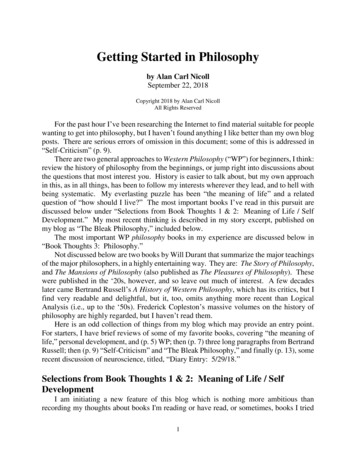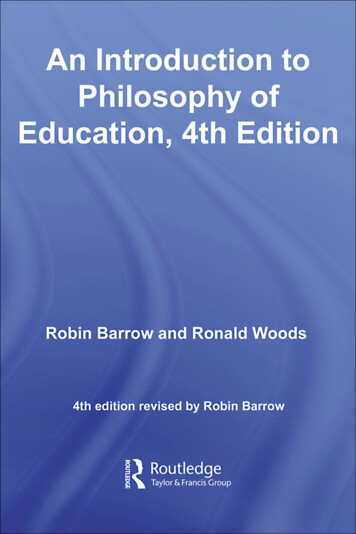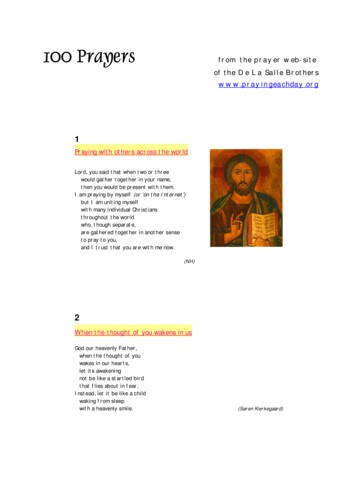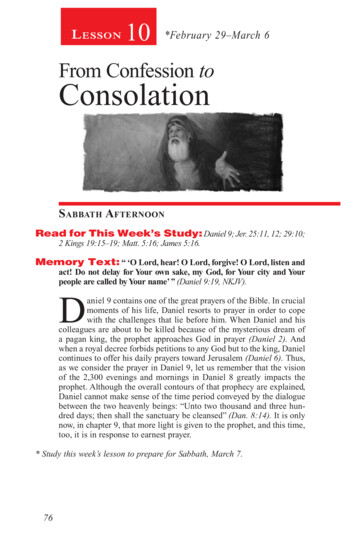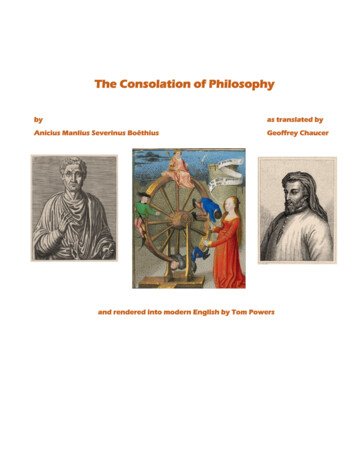
Transcription
The Consolation of Philosophybyas translated byAnicius Manlius Severinus BoëthiusGeoffrey Chaucerand rendered into modern English by Tom Powers
Table of Contents (click on a heading for direct link)IntroductionBackgroundThe Message of The ConsolationThis “Rendering”AcknowledgementsBook IMeter 1Book IIProse 1Book IIIProse 1Book IVProse 1Book VProse 1Prose 1Meter 1Meter 1Meter 1Meter 1Meter 2Prose 2Prose 2Prose 2Prose 2Prose 2Meter 2Meter 2Meter 2Meter 2Meter 3Prose 3Prose 3Prose 3Prose 3Prose 3Meter 3Meter 3Meter 3The prisonerbemoans his fate.He is visited by aregal lady.This special man hasyielded to defeat.She determines tocure his depression.His grief subsides;his vision clears.He recognizesPhilosophy, the foeof evil.Fortune’s stability isin her continual flux.Fortune’s wheel liftsand crushes.Fortune’s gifts arehers to give and take.The greedy man isnever rich enough.See and cherish thegifts you still have.Nothing that lives isunchanging.To see truehappiness, you mustfirst understand falsehappiness.Honey is sweeter ifmouths have firsttasted flavors that arebitter.Men search forhappiness in riches,honors, power, fame,and carnal joy.All things seek toreturn to their ownpath.She demonstrateshow false goodsbring no happiness.Greed is neversatisfied by riches.Why does crime payso well?Rise above earthlythings to see divinetruth.The power of goodpeople; theimpotence of the bad.The slavery ofwickedness.The true reward forgoodness isgoodness. Wickedpeople are likevarious animals.Story of Ulysses andCirces. Evil may notconquer a goodman’s heart.The true nature ofchance occurrences.The law of divineorder diectsseemingly chancehappenings.Does free will exist?God sees everythingin one stroke ofthought.How can God’sprecognition coexistwith man’s free will?If God knows all thatwill happen, isn’t heto blame for all evil?Meter 3Earthly existence hasobscured man’svision from seeing orremembering thetruth.1
Book IMeter 4Book IIProse 4Book IIIProse 4Book IVProse 4Book VProse 4Prose 4Meter 4Meter 4Meter 4Meter 4Meter 5Prose 5Prose 5Prose 5Prose 5Prose 5Meter 5Meter 5Meter 5Meter 6Prose 6Prose 6Prose 6Prose 6Meter 6Meter 6Meter 6Hope for nothing;dread nothing to befree.Boethius’ bio and hiscomplaints.Why does God fail torule man?Philosophy: God hasnot abandoned you;you have fled thesafety of your truehome.The rebel againstnature’s laws mustfail.Philosophy, asdoctor, diagnosis hisills.Meter 7Abandon joy, driveaway fear, dispelhope, and do not letsorrow approach.Men are eithermiserable over whatthey have lost, orover what they maylose.Build your house ona solid foundation.Why do you embracealien goods as if theywere yours?Happy was the firstage of men. Theywere content withlittle.Honor does not cometo virtue throughdignity, but the otherway around.The horror of joiningevil with power.Prose 7Honors may befouled by rogues,dim over time, or bescorned by thepeople.What happiness is inthe lordship of aNero?Those who havepower live in fear.A truly mighty rulermust conquerhimself.What value is gloryor fame to theconscience of wisemen?Since all men comefrom God, no one isignoble unless givenover to vice.Bad men areunhappier whenunpunished thanwhen they arechastised righteously.Why are menaddicted to deadlywar?Boethius is baffledwhy good God letsbad people inflictpain on good people.The ignorant arebaffled and agitatedby unusual naturaleventsComparison andcontrast ofProvidence anddestiny.Prose 7Meter 7Meter 7Meter 7Prose 8Prose 8Death equalizes thehighest and lowest.Mean Fortune can beinstructive.The sickness ofcarnal joys.Carnal joy is like abee: first honey, thena sting.Whence comes theself-knowledge thatprobes and beholdsall things?The different levelsof mind perceivereality differentlyand cannot know theperceptions of thehigher levels.Meter 5Of all animals, onlyman can look up tothe divine presence.Prose 6The simple stabilityof the divine mindperceives all time asone.All things desire tobe under the rule ofgood.Prose 7Man’s glory is tinyand soon forgotten.Man perceives withbody, imagination,reason. Each higherthan the other. Godperceives differentlywith simpleintelligence.Philosophy argueswhy all fortune isgood!Tales of men whoconquered nature andthemselves.Worldly goodscannot give whatthey promise becausethey lack the unionof all their variousgood qualities.2
Book IBook IIMeter 8Man would be happyif Love that rules theuniverse ruled hisheart.Book IIIMeter 8Book IVBook VMen seek good in allthe wrong places.Prose 9Philosophy provesthe unity of thequalities of truegood.Meter 9Prayer to God theEngineer of theuniverse.Prose 10Philosophy uses thetools of rationalargument to provethe origin of truegood.Meter 10See the brightness bywhich the heavensare governed; thenreject this darkdomination over yoursoul.Prose 11All things strive tokeep the unity oftheir parts.Meter 11Seek truth withinyourself, notexternallyProse 12Philosophy continuesher rational argumentfor God’ssupremacy.Meter 12The story of Orpheusand Eurydice3
IntroductionLet me begin by saying that this is a work of love, rather than of scholarship. I am proficientin neither Latin, Greek, nor Middle English. I have not deeply studied the classics of the ancientGreeks, Romans, nor early Christians so, I am decidedly an amateur! So, what has drawn me tothe Consolation of Philosophy, its sixth century Roman creator, Anicius Manlius SeverinusBoëthius, and its fourteenth century English interpreter, Geoffrey Chaucer?From childhood, I have felt a keen revulsion for much of the life of superficial emotion that ison unashamed parade all around us. It seems to me that almost every influence on human life isaimed at stealing from us the desire and ability to experience life in a sober, meaningful way. I seepeople wallowing in grief and self-pity in response to imposed or imagined losses or dangers. I seepeople hysterically titillated by truly trivial events that have nothing to do with them. I see peopletrapped in blind rages or sullen, annoyed pouts at imagined slights or snubs. Then with extremereluctance, I occasionally see myself doing all these things and being no better, no different thanother people – except, perhaps, for a lingering wish to be other than I am in fact, to be.I was raised in an unusual household. My parents, having early on eschewed all attachment toorganized religion as well as to theism, were deeply committed to struggles for social, economic,and racial justice. They fought to encourage young people to become progressive leaders in thehope of displacing the old and corrupt guard. My parents had no interest in accumulating wealth andspent what little they had on their various projects. They endured betrayal by colleagues, repeatedfailure, and even jail without becoming defeated by the bitterness or regret that felled so many oftheir comrades. Their strength was founded on an unshakable faith, not in God, but in the basicdecency of mankind.Observing such a serious family at close range, it was, perhaps not strange that at a young age,I found sympathetic vibrations in such works as The Manual by Epictetus, The Holy Rule by St.Benedict, The Pilgrim’s Progress by John Bunyan, the transcendental poems of WilliamWordsworth, and The Seven Storey Mountain by Thomas Merton. Only much later in life was Iintroduced to the ideas of G. I. Gurdjieff and P. D. Ouspensky 1 and joined the Gurdjieff Foundationof Illinois. It was from Gurdjieff that I began learning to see myself in the faces around me and tosense the compelling need to look inside myself for the energy to strip away layers of accretedfalseness that had clung to my essence from years of survival in a world of deceit. It seems to methat having spent much of my life as an atheist enabled me to absorb philosophical and theosophicalwritings with something of a child’s questioning naiveté, and without the automatic associationsthat can shut down or dim the perceptions of a person who has been steeped in religious dogma anddoctrine. Gurdjieff wrote the shocking assertion that people who do not succeed in working onthemselves have no being, do not exist as humans. Boethius wrote, “Perhaps it seems to some folksa fantastical thing to say that the wicked, who are the majority of men, are nothing–have no being;but nevertheless, it is true” (Book III, Prose 2).I first read the Consolation of Philosophy during the summer after high school having beeninspired by a quirky and brilliant teacher, Ms. Margaret Annan. Ms. Annan pointed out thesometimes gentle, sometimes bitter satire that underlie many of Chaucer’s tales. She suggested thateven though the object of the characters’ pilgrimage was the shrine of Thomas à Becket, who hadbeen martyred 200 years earlier for challenging the supremacy of the king over the rights andprivileges of the Roman Catholic Church, that church was still powerful, still the official church ofthe land (until 1534), and that Chaucer may well have been taking considerable risk by scoffing atthe flawed bearers of its message. Perhaps because of the annoying questions I continually fired atFor those interested in exploring the ideas developed by Gurdjieff, I recommend reading In Search of the Miraculous by P.D.Ouspensky and All and Everything by G. I. Gurdjieff (consisting of three books: Beelzebub's Tales to His Grandson or AnObjectively Impartial Criticism of the Life of Man, Meetings with Remarkable Men, and Life is Real Only Then When I am).14
her, she recommended that I read the one prosaic piece among the poetry of the Canterbury Tales:“The Parson’s Tale.” I was hooked! The parson’s stern, but gentle insistence on turning away fromthe frivolous, poisonous things in our lives in favor of the hard, realities that make life worth livingspoke loudly to something within me. Then I began reading and re-reading the Consolation.5
BackgroundIn the year 524, a Roman gentleman named Anicius Manlius Severinus Boëthius languished inprison awaiting execution for treason against the king. Boethius’ family had a long and noblehistory dating back hundreds of years to at least the early days of the Roman Empire, and includingsenators, consuls, emperors, and prefects, and culminating 65 years after Boethius’ death with PopeGregory the Great. The Anicii family had become fabulously wealthy, owning many large estatesand gaining a reputation for profitable generosity. Some two hundred years before Boethius, SextusClaudius Petronius Probus did much to enhance the family fortunes as recounted by the fourthcentury historian Ammianus Marcellinus who portrayed him as a vain and rapacious man who"owned estates in every part of the empire, but whether they were honestly come by or not is not fora man like me to say." Ammianus adds that Probus was one who was benevolent to his friends and apernicious schemer against his enemies, servile to those more powerful than him and pitiless tothose weaker, who craved office and exercised enormous influence through his wealth, alwaysinsecure and petty even at the height of his power. 2 I mention this because I find it striking in thecontext of Book II, Prose 5. One more interesting fact about Boethius’ forebearers: it seems thatthey were among the first noble families to convert to Christianity during the reign of Constantine.Although orphaned at an early age, Boethius was adopted into another prominent Romanfamily (his step-father later became his father-in-law) and enjoyed a privileged life and an educationin science, mathematics, history, Greek, and philosophy that was becoming increasingly rare in anItaly that was no longer an empire but was occupied by foreign conquerors (in Boethius’ time, theOstrogothic king Theodoric the Great). The trappings of Roman civil and political life including theSenate were tolerated, for a time, by the new rulers who were focused on enriching themselves andtheir followers at the expense of the Roman people. Roman dominance and society had long been indecline and its leaders were deeply corrupt and were willing to win favors from Theodoric’sgovernment in exchange for selling out their friends and associates. As a brilliant scholar andgentleman of leisure, Boethius might have lived out his life insulated from the increasing collapseof the civilization he cherished. But Boethius was lured into the civil service at Theodoric’s court atRevenna with hopes of combatting corruption and fighting for the rights of the people. This was aninevitable, but fatal decision.Boethius’ erudition (he translated from Greek to Latin significant works of Aristotle andPorphyry, wrote textbooks on logic and music, and composed theological treatises, would have anenormous influence on students of philosophy and divinity during the next thousand years. But noneof Boethius’ legacy had as strong an influence on the Middle Ages as his final work, TheConsolation of Philosophy. It was translated from the Latin for the benefit of the English peopleseveral times during the medieval period. First, into Anglo-Saxon (aka Old English) during thereign of King Alfred the Great who ruled from 870 to 899. Geoffrey Chaucer took his turn around1385 turning it into the English of his day, now known as Middle English. Queen Elizabeth Itranslated it again in 1593. The appeal of The Consolation waned as western man experience a“renaissance” turning with ever-greater passion to the false gods of which Boethius so eloquentlywarned.Ammianus Marcellinus, History, Book 27, ch.11; The Later Roman Empire selected and translated by Walter Hamilton (Penguin,1986), p.345).26
The Message of The ConsolationThe plea within The Consolation that rang true for so many for 1500 years is in how toprogress from an ordinary life of unhappy superficiality to a deep understanding of difficultconcepts and values that can give our short lives purpose and joy. 3 Rather than writing in esotericphilosophical terminology, Boethius creates a dialogue between himself and “his old nurse”Philosophy. She finds him in his prison cell weighted down with bitterness and regret for havinglost everything that makes life worthwhile. By gentle steps, she restores him from alienation, torecognizing that he has lost nothing of true value and that he has not been abandoned by theimmortal power of God. It is interesting that nowhere in The Consolation is there a mention ofChrist or of the Judeo-Christian traditions. Boethius reaches back to Greek and Roman history,traditions and myths and to illustrations from nature and the agrarian life of the common people toillustrate his points.Philosophy’s methodical, logical arguments, especially in Book III, Prose 10 and Prose 12seem to require one significant leap of faith: the existence of an omnipotent, beneficent God. Butjust as I did not find Boethius’ reliance on Ptolomeic cosmology (the accepted science of his (andChaucer’s) day in Book II, Prose 7 particularly jarring, I am not much put off by Boethius’theocentric understanding (Book IV, Meter 1). I find inspiration in Philosophy’s entreaty (Book III,Meter 11): “Whoever seeks truth through deep thought and longs not to be deceived by missteps, lethim turn and contemplate within himself the light of his inner sight.”While the original Latin work consists of alternating sections of prose and poetry, andChaucer was a certainly a magnificent poet, he chose to produce his translation entirely in prose.The reason becomes quickly apparent. Chaucer continually injects explanations or clarificationscalled “glosses” into the text. His mission was not to create art, but to transmit this vital message tothe people.I recommend reading John Marenbon’s excellent essay on Boethius and, especially on TheConsolation: s/boethius/. but only afterabsorbing and considering The Consolation itself.In the 17th century the English Puritan preacher, John Bunyan accomplished much the same thing with The Pilgrim’s Progress, abeautiful allegory of man’s efforts to achieve spiritual perfection written in simple language for the benefit of the masses. I thinkthat he should be an inspiration to English teachers who wish to find or develop interesting and thought-provoking materials.37
This “Rendering”I have tried to stay as close to Chaucer’s translation as reasonable and consistent withclarity. To assist the reader with following this three-way comparison of my modern version toChaucer’s Middle English and to Boethius’ Latin, I made some minor changes of punctuation andparagraphing to both of the original versions in order to synchronize them with the Modern Englishtext.Middle English did not make use of quotation marks; instead Chaucer introduces eachchange of voice with the words ‘quod I’ or ‘quod she.’ Sometimes Chaucer introduces the name orinitial of the speaker first as in the script of a play (but still inserts the “quods” into the sentence thatfollows. Also, the modern version breaks up Chaucer’s run-on sentences and a few very longparagraphs.Throughout Chaucer’s translation are his helpful hints and words of explanation. He usuallyintrduces them with the words ‘that is to say’ or ‘as one might say.’ I have identified them in themodern translation as bracketed comments introduced by the words ‘Chaucer’s note’as thus:1. Go now, you mermaids who are sweet until the end comes, and let this man be curedand healed by my muses [Chaucer’s note: by beneficial sciences].As I said earlier, although I have labored to make this rendering of Chaucer’s translation asclose to his text as I could while ensuring the modern reader an undistracted experience, this is not awork of scholarship but love and gratitude. Errors of translation and clumsiness of expression are allmine. I hope that the torch which Boethius lit, and which Chaucer kept burning will continue toinspire the inner work of those who seek inner truth in our own day.8
AcknowledgementsChaucer’s Boece texts:1. The Works of Geoffrey Chaucer, Ed. R. N. Robinson, 2nd edition, 1957, Houghton MifflinCompany, The Riverside Press, Cambridge, MA2. Chaucer's translation of Boethius's "De consolatione philosphiæ," Ed. Richard Morris, OxfordUniversity Press, 1868, online version: Ann Arbor, MI: University of Michigan Humanities TextInitiative 19993. The Complete Works of Geoffrey Chaucer, Ed. Rev. Walter W. Skeat, (vol. 2: Boethius andTroilus), 1894, The Clarendon Press, Oxford, online version: Gutenberg -h/44833-h.htm)Boethius’ Latin texts:4. The Consolation of Philosophy, with the English translation of "I. T." (1609), Revised by H. F.Stewart, Cambridge, MA, Harvard University Press, William Heinemann, Ltd, London, 19685. Boethius: Consolatio philosophiae, 3 vols, Ed., James J. O'Donnell, Bryn Mawr LatinCommentaries, Bryn Mawr, Pa.: Thomas Library, Bryn Mawr College, 1990.Other English translations:6. The Consolation of Philosophy, translated with an introduction by V. E. Watts, 1969, PenguinBooks, Ltd., Middlesex, UK7. The Consolation of Philosophy, translated by W. V. Cooper, B.A., King's College, Cambridge,1901 Published by the Ex-classics Project, 2009, lic Domain8. The Consolation of Philosophy, translated by H. R. James, Oxford, George Routledge & Sons,Ltd. London 1897Commentary:9. "Anicius Manlius Severinus Boethius", Marenbon, John, The Stanford Encyclopedia ofPhilosophy (Winter 2016 Edition), Edward N. Zalta entries/boethius/Glossary10. A Glossary for the Works of Geoffrey Chaucer (in the Riverside Edition). Last modified: Nov20, 2008 Copyright The President and Fellows of Harvard College URL:http://sites.fas.harvard.edu/ chaucer/glossar.htm.9
The Consolation of PhilosopyBook I – Meter 1Alas! Weeping, I am forced to begin verses on sorrowful matters, that at one time, during myflourishing years of study, I made into sweet songs. For lo! Rending muses of poets dictate to methings to be written, and dreary verses of wretchedness wet my face with true tears. At least no fearmight overcome those Muses, keeping them from accompanying me on my way into exile. They whowere the glory of my youth, when healthy and young, comfort me now in the sorrowful fate of myold age. For age has come unexpectedly on me, hastened by the harms done to me, and sorrow hasstamped age upon me. White hairs are sprinkled untimely upon my head, and the slack skin trembleson my wasted body.Death of men is welcomed not when it comes in the sweet years, but when, often called for, itcomes to wretches. Alas, alas! with how deaf an ear cruel death turns away from wretches andneglects to close weeping eyes. While unfaithful Fortune favored me with gleaming gifts, thesorrowful hour of death had almost drowned my head. But now that cloudy Fortune has changed herdeceitful manner toward me, my pathetic life persists in dragging on.Oh, you my friends, why did you applaud my good fortune? For he who has fallen never stoodon firm footing.Book 1 – Prose 1Meanwhile, as I still recorded these things for myself, and penned my tearful complaints, I saw,standing above the height of my head a woman, seemingly of great majesty, her eyes glowing andclear-sighted beyond the ordinary power of men. She had a lively color and such vigor and strengththat it could not be diminished, despite the fact that she was of so great an age that no one wouldimagine that she was of our generation. Her height was uncertain, for sometimes she contracted andshrunk herself to the common measure of men; and sometimes it seemed that she touched theheavens with the top of her head, and when she raised her head higher, she pierced the very heavens,so it would be in vain for men to try to see her.Her clothes were made of quite delicate threads and subtle craft, of strong material. She hadwoven these clothes with her own hands, as I found out later when she explained and demonstrated tome their beauty. The darkness of a forgotten and despised past had besmirched and dulled theseclothes just as a picture may be darkened with smoke. In the lowest hem or border of her robe, onecould read a woven Greek P signifying the active life; and above that letter in the highest border, aGreek T signifying the contemplative life. 4 And between these two letters there were seen degrees,nobly wrought in the form of ladders, by which degrees men might climb from the lowest letter to theuppermost. Nevertheless, the hands of some men had carved that cloth by violence or by strength, andeach one of them had carried away such pieces as he might get. And truly, this woman carried smallbooks in her right hand, and in her left hand she bore a scepter.And when she saw these poetical Muses clustered about my bed, and reciting words to my tears,she was a little aggravated and glowed with cruel eyes. “Who,” she cried, “has allowed these strumpetsfrom the place men call the theatre to approach this sick man? They not only cannot assuage hissorrows with any remedies, but they would feed and nourish him with sweet venom. They are thosewho with thorns and goads of talents or affections which have nothing fruitful or profitable, destroythe plentiful crop of the fruits of reason. They hold the hearts of men in bondage, but cure no one fromsickness.4Π or pi, for practical philosophy and θ or theta for theoretical philosophy.10
“If you Muses had taken from me with your flatteries any dull and unprofitable man, as may bereadily found in the population, I would doubtless suffer less grievously, because in such anunprofitable man, my purposes would not be thwarted. But you pull away this man who was nourishedin the studies or schools of the Eliatics and Academics in Greece. Go now, you mermaids who are sweetuntil the end comes, and let this man be cured and healed by my muses (the beneficial sciences).”And thus, this company of Muses, rebuked, angrily cast down their gazes to the earth, andshowing by blushes their shame, they sorrowfully passed the threshold. And I was so affected by thesight that I was plunged into tears and gloom so that I could not recognize that woman of so imperialauthority. I became all abashed and stunned, and cast my sight down to the earth, and remained still,waiting to see what she would do next. Then she came near and sat down upon the furthest corner ofmy bed and beholding that my face was bent to the earth, heavy and aggrieved with weeping, she usedthese words to grieve at the disquiet of my mind.Book 1 – Meter 2“Alas, how the mind of man, drowned with overflowing depression, dulls and abandons its ownclarity, heading into foreign darkness whenever his troubles grow endlessly. It is driven to and fro byworldly winds. This man, that once was free, to whom the heavens were open and known, and waswont to go in heavenly paths and to observe the light of the red sun; and to see the stars of the coldmoon, and which star in heaven followed wandering paths moved by diverse spheres – this conqueredman, had comprehended all this by astronomical calculations. And beyond this he was wont to searchthe causes when the blowing winds move and trouble the smooth water of the sea; and what spiritturns the stable heaven; and why the star arises out of the red east, to fall into the western waters, andwhat tempers the lusty hours of the first summer season that awakens and dresses the earth with rosyflowers; and who makes that bountiful harvest in years of plenty flowing with heavy grapes. And also,this man was wont to explain the diverse causes of hidden nature. Alas! now he lies emptied of thelight of his mind, and his neck is pressed with heavy chains, and bares his face downward for the greatweight, and is forced to gaze on the foul earth!Book I – Prose 2“But now is the time,” said she, “for medicine rather than complaint.”She studied me with all the force of her eyes and said, “Are you not he who once, nourished withmy milk and fostered with my meats escaped and grew to have the heart of a real man? Certainly, Igave you such armor that if you yourself had not first thrown them away, they should have defendedyou in invincible health. Don’t you know me? Why are you still? Is it for shame or for astonishment? Iwould rather that it was for shame, but it seems to me that astonishment has oppressed you.”And when she saw me not only still, but without power over my tongue and all dumb, she laidher hand softly upon my breast and said, “Here there is no peril, he is fallen into a lethargy which is acommon sickness of deceived hearts. He has forgotten himself a little, but certainly he shall easilyremember himself if it is so that he once knew me; and so that he may do so, I will wipe his eyes a littlethat have been darkened by the cloud of mortal things.”With these words, she gathered the hem of her garment into a fold and dried my eyes that werefull of the waters of my weeping.Book I – Meter 3Thus, when the night was dispersed and chased away, darkness left me, and my eyes wererestored to their original strength. And just as when, by example, the sun is hidden when the stars are11
covered with clouds by a swift wind called Chorus, and the firmament remains dark with wet stormyclouds; and the stars do not appear upon the heavens, so that night seems spread upon the earth, ifthen the wind called Boreas sent out of the cave in the country of Thrace, chases away this night anduncovers the hidden day, then Phoebus shines forth, trembling with sodden light, and smites with hisbeams marveling eyes.Book I—Prose 3And thus, the clouds of sorrow dissolved and faded away. I looked heavenward determined toknow the face of my physician. So, setting my eyes on her and focusing my vision, I beheld my nursePhilosophy, in whose house I had conversed and spent time from my youth.I addressed her thus, “Oh thou mistress of all virtues, descended from the royal throne, why haveyou come into this solitary place of my exile? Have you come because you have been found guilty alongwith me of false charges?”“Oh!” she exclaimed, “my child, should I forsake you now and should I not share with you bycommon labor the burden that you have assumed in defense of my name? Certainly, it would not belawful nor suitable for Philosophy to abandon without companionship the path of him who is innocent.Should I then fear blame against me, and tremble as though some new thing had befallen? Don’t youknow that Philosophy has been assailed before now by folks of wicked ways? Have I not struggled ingreat battles in olden times, before the age of my Plato, against the foolhardiness of folly? And also, inthe lifetime of the same Plato, his master Socrates won the victory of wrongful death in my presence.The heritage of this Socrates, that is to say the doctrine of Socrates in his opinion of felicity, which I callhappiness, when the people who followed the Epicureans and Stoics and many others strove to ravish,every man for his part drew on the words of Socrates in defense of his own opinion, they swarmed toattack me, crying and debating their arguments. Thus, they carved and tore my clothes that I hadwoven with my hands; and with the scraps that they tore from my clothes, they went away believingthat I fully supported them. In as much as these Epicureans and Stoics seemed to display some tracesor steps of my habit, the folly of men believing those Epicureans and Stoics to be my followers, waylaidsome through the error of the wicked or through the ignorance of the multitude. So, because theyseemed to be philosophers, they were pursued and slain.“So, even if you hadn’t known of the exiling of Anaxagoras, nor the poisoning of Socrates, nor thetorments of Zeno, for they were foreigners, yet you might have known the followers of Seneca, ofCanius, and of Soranus whose renown is neither archaic nor uncelebrated. Only this caused the deathsof these men: they were informed of my ways and seemed most averse to the studies of wicked men.“Therefore, you s
God sees everything in one stroke of thought. Meter 3 His grief subsides; his vision clears. Prose 3 See and cherish the gifts you still have. Prose 3 She demonstrates how false goods bring no happiness. Prose 3 The true reward for goodness is goodness. Wicked people are like va




